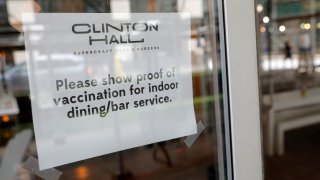
- The Biden Administration set a Jan. 4 deadline for businesses with 100 or more employees to require workers to get vaccinated.
- Court rulings have put the vaccine mandate on pause.
- The stop-and-start nature of the Covid vaccine mandate is leaving many CHROs frustrated.
The Covid-19 vaccine mandate is solving some thorny issues for chief human resources officers — but it's creating new problems that are tougher to solve.
The Biden administration set a deadline of Jan. 4 for private businesses with over 100 employees to require workers to get vaccinated, or alternatively, take a weekly Covid-19 test and regularly wear a mask. A court ruling last week hit the pause button on the mandate. On Friday night, the appeals court rejected the Justice Department's request to lift the freeze and raised serious questions about the potential impact on workforces and the constitutionality of the mandate.
This vaccine mandate start and stop has left many CHROs feeling frustrated. Marcus Bryant, chief people officer at FareStart, said before the vaccine mandate was announced, the anticipation of when it would be rolled out was unsettling.
Get Connecticut local news, weather forecasts and entertainment stories to your inbox. Sign up for NBC Connecticut newsletters.
"At times, [a vaccine mandate] seemed like it was looming or impending. Like this thing was coming and nobody knows when it's going to happen," Bryant said. Having the vaccine mandate announced sooner would have gone a long way in helping him clarify things for his workforce, he said.
Vaccine mandates create new problems
But it's not all smooth sailing from here. Among the difficulties that companies are anticipating because of the vaccine is potentially higher turnover among employees.
Money Report
"We've been very fortunate and just about 90% of our company is vaccinated at this time," said Bryant, whose organization provides skills training and provides meals as part of a mission focused on poverty and homelessness. "But we also know that some of our sister companies may not be as fortunate. If all of their people decline, that's tons of intellectual knowledge walking out the door. If they don't want to get a [Covid-19] test and they don't want to get a vaccine, they no longer work at that company," Bryant said.
Before the Biden vaccine mandate could be finalized, Bryant said FareStart went ahead and set a deadline requiring employees to be fully vaccinated by Dec. 10. "[Biden's mandate] is really going to help us have a little bit more footing," Bryant said. "In our department, in particular, we now have something to stand on."
On top of turnover, which leads to problems attracting new talent in an already-strained labor market, HR chiefs face difficulties supervising unvaccinated employees.
"We anticipate a lot more oversight and policing. We are planning on using a current verification system to check vaccine status, which is not a big deal," said Brenda Leadley, head of human resources for the Americas for Allianz Global Corporate & Specialty. "The tricky part is for the unvaccinated. We have multiple offices in multiple states with various setups. How do we ensure that the unvaccinated who show up for work that day have done their weekly test and wear a mask?"
Leadley said she will additionally have to create a new committee within her department to review religious exemptions and requests to work remotely if employees don't feel comfortable coming into the office. Leadley added that the rapid timing between when a date is chosen until the planned requirement date of the vaccine mandate creates another challenge for her department.
"I get it. We want to make things as safe as possible as quickly as possible," Leadley said. "But it's still a challenge."
Like FareStart, SoFi started requiring employees to be fully vaccinated on Nov. 1. Anna Avalos, chief people officer at the personal finance platform, said her biggest priority is the health and safety of the company's employees. A vaccine requirement helped her achieve that goal.
Steve Pemberton, CHRO at Workhuman, said, "what the mandate does do is reinforce the importance of the vaccine and its effectiveness in the fight against Covid-19." Pemberton said Workhuman also has a company-wide vaccine requirement for employees coming back into the office.
Many U.S. companies, such as United Airlines, CVS Health and Walmart, have implemented a vaccine mandate while other companies, such as Bank of America, encourage vaccines but do not require it.
"I think we have some colleagues that unfortunately have struggled with a lack of clarity around [their] organization's stance around the vaccine, which has caused a lot of angst across our industry," Bryant said.
The White House recommended on Nov. 8 that private businesses implement their own vaccine and testing requirements, despite the court-ordered pause. If more and more businesses across the U.S. require vaccines and testing, problems will continue to come and go for HR chiefs.
"I hope that ultimately, this is going to be just a nice little nudge to get people vaccinated, and that will make the workforce so much safer," Lawrence O. Gostin, WHO Center on National and Global Health Law Director and Georgetown University professor, said at the recent CNBC Workforce Executive Council Summit. "If you're not vaccinated, you pose a much greater risk of transmitting the infection, which could be even deadly to another coworker, so no one has the right to go into a crowded workspace unmasked and unvaccinated and expose another person to an infectious disease that's quite serious."
"We have been incredibly fortunate in how we brought our staff up from the very beginning," Bryant said. "But I don't think that's necessarily true for a lot of businesses and it's going to be a really hard time when enforcement day comes."






